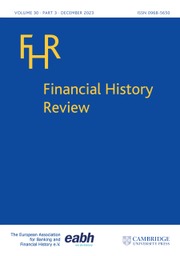Article contents
Information asymmetries and conflict of interest during the Baring crisis, 1880–18901
Published online by Cambridge University Press: 04 May 2011
Abstract
This article examines the potential conflict of interest of underwriters in London's foreign sovereign debt markets prior to the Baring crisis of 1890. We describe the main sources of information for investors concerning Argentina, whose government debt default contributed to Baring's collapse, and compare them with those of the underwriters, particularly Baring's. We then present some empirical evidence using data on bond prices and underwriting fees that demonstrate that Baring did not exploit its information lead to the detriment of investors. Finally, we present historical evidence that shows that Baring foresaw default before markets did and consequently planned a bailout loan that could not be issued due to political instability in Buenos Aires.
JEL classification
- Type
- Articles
- Information
- Copyright
- Copyright © European Association for Banking and Financial History e.V. 2011
Footnotes
This paper has been presented at several events. I would like to thank the following people for the comments they offered on previous versions: Marc Flandreau, Stefano Battilossi, Michael Bordo, Gerardo Della Paolera, Pablo Martin Aceña, Sebastian Nieto, Jérôme Sgard, and participants at the EHESS meeting in Istanbul 2005, the LACEA Meeting in Mexico 2006, the OFCE Seminar of Economic History in April 2007, the APHE Meeting in Lisbon in November 2007, the First Euro-Clio Conference and Fast-Track Initiative ‘Exchanges in economic history’ in Paris 2008, and the Globalization and History Conference in UCLA in April 2009. Comments made by the editor and anonymous referees were most useful. I would also like to thank the archivists at ING Baring, Archives Paribas, Crédit Lyonnais and the Rothschild archives. Financial support from the Ministry of Education and Science in Spain through the Consolider project CSD 2006-00016 is also acknowledged. I am solely responsible for any remaining errors.
References
References
Sources
- 12
- Cited by


